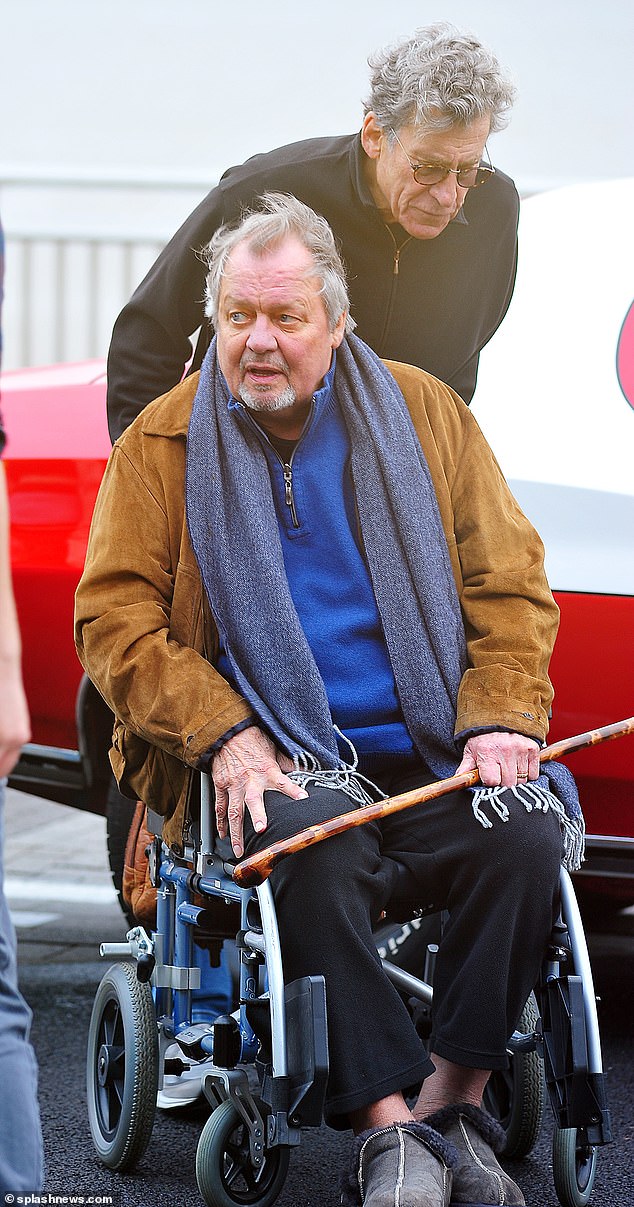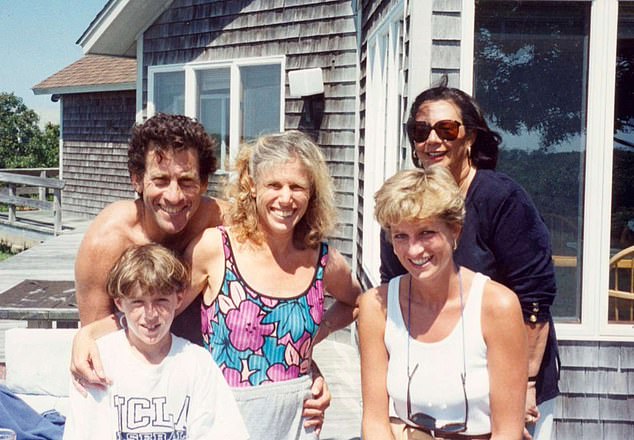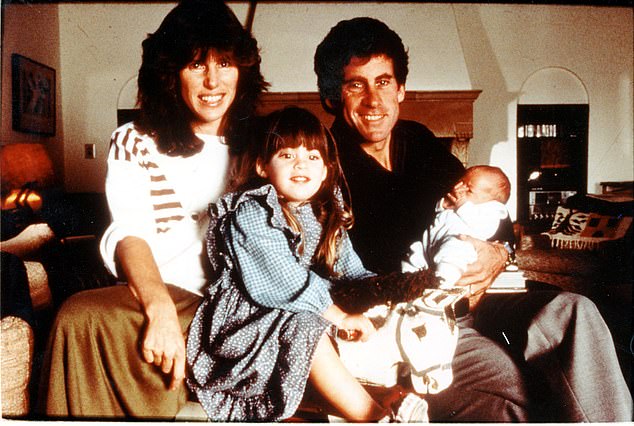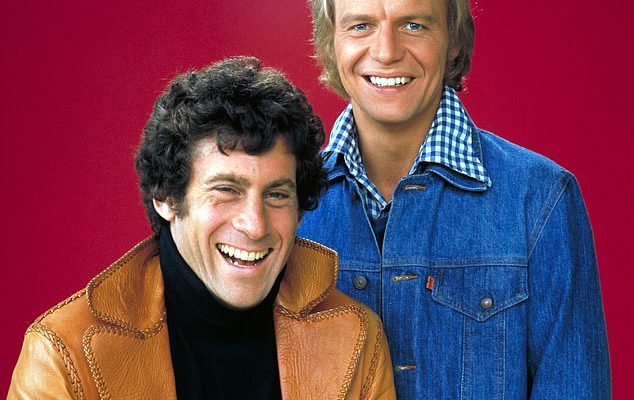HIS onscreen swagger — and those unforgettable belted cardigans — made Paul Michael Glaser the epitome of 1970s cool. Starring alongside David Soul in the iconic detective show Starsky & Hutch, Paul, who played the streetwise Starsky, was all action, all wisecracks.
So indelibly is he linked to his most famous macho cop character, it’s something of a surprise to be faced with such a thoughtful, introspective man.
Part of that introspection may lie in the fact that this is his first interview since David Soul — aka the more cerebral Hutch — died in January at the age of 80.
For women of a certain vintage, when David passed away, part of our girlhood went with him.
But Paul lost a ‘brother, a friend, a caring man’. Despite the fact the series — in which the pair tore around the streets of the fictional Bay City, California, in the distinctive red and white Ford Gran Torino — ended in 1979, the actors remained close for the next 40 years.
Paul Michael Glaser (left) as the streetwise David Starsky and David Soul as the more intellectual Kenneth “Hutch” Hutchinson

Paul Michael Glaser pushes his old friend David Soul in a wheelchair in Liverpool in 2017
In the immediate aftermath of Soul’s death, Paul admitted he found it ‘difficult to comprehend David’s passing . . . It just takes time, I tell myself; saying goodbye to such a dear friend and important part of my life I suspect that I will let myself feel his loss, our loss, only gradually. We shall never see his like again’.
These were feelings clearly reciprocated by David Soul: he described Paul on Twitter late last year as someone who ‘is and will always be my best friend, my brother’.
While Soul had to overcome demons in his private life — married five times, he battled issues with alcohol — his friendship with his former co-star remained constant.
Glaser was even pictured carefully pushing his friend in a wheelchair in 2017 at an event they attended together — a hip replacement that went wrong had seen Soul spend 72 days in intensive care.
Though the cause of David’s death has not been disclosed, he was known to have previously battled cancer and chronic obstructive pulmonary disease — a life-shortening lung condition he attributed to having been a heavy smoker at one time.
‘We spoke about a week and a half before he died,’ says Paul, now 80, ‘and even though I knew he hadn’t been doing well for a while, because he and I would talk about it a lot, I just didn’t know how fast it was happening’.
For all his success, loss has, sadly, been an all-too-prominent feature of Paul’s life. In 1988, his daughter, Ariel, died, not long after celebrating her seventh birthday. Six years later, in 1994, his wife of 14 years, Elizabeth, also died, aged 47.
Both mother and daughter lost their lives due to complications from Aids — a terrible disease that carried a huge stigma for sufferers back then, even those living in the glossy world of Hollywood. As Elizabeth said, before tragedy struck, they had been ‘the picture-perfect family’.
Nevertheless, the Glaser family’s devastating experience was turned into something positive. Elizabeth created a foundation to fund research into Aids/HIV, and it was hearing her story that helped inspire Princess Diana’s work in this field, with the two women becoming friends.

Paul, Elizabeth and Jake with Princess Diana and a family friend in 1994
In 1994 Diana visited the Glasers at their holiday home in Martha’s Vineyard, Massachusetts.
‘I really liked her — she was fun, available and very approachable,’ says Paul.
‘And she came to see Elizabeth — not me,’ he adds. ‘I was just Elizabeth’s husband.’
Paul and Elizabeth, a teacher, had met in 1975 after he spotted her in an LA traffic jam. He signalled to her to pull over and then jokingly asked to see her driver’s licence and registration. Starsky & Hutch had yet to air, but his charm clearly worked.
They married after five years together and the births of their two children followed.
But in 1985, they sought medical advice after becoming worried about the persistent and severe stomach aches from which four-year-old Ariel had been suffering.
After numerous tests, the couple — Paul was then 42 and Elizabeth 38 — were devastated to learn their little girl had tested positive for HIV.
This was, after all, a time when Aids was an almost certain death sentence, and ignorance meant those who carried HIV were often shunned by their communities, something the Glasers would experience themselves.
It transpired that Elizabeth had contracted the virus directly after giving birth to Ariel in 1981 — from a contaminated blood transfusion she needed after she had suffered a haemorrhage.
This was at a time early on in the Aids epidemic when blood donations were not routinely screened for HIV — indeed, a test for the virus became available only in 1985.
Unaware she had been infected, Elizabeth began breastfeeding Ariel and, in doing so, is believed to have passed the virus on to her baby daughter.
In 1984, still unaware of her HIV status, Elizabeth gave birth to the couple’s second child, Jake. Following Ariel’s diagnosis, it was later discovered that he, too, had been infected with HIV — having contracted it in the womb.

Paul Michael Glaser with wife Elizabeth , daughter Arial and son Jake before tragedy struck
Paul, however, escaped infection — the virus can be passed on during intercourse — because he is a carrier of a rare gene now known to resist the HIV virus.
It later emerged that Jake had inherited that gene from his father, which gave him some resistance to Aids.
Eight years ago, Jake crossed paths with Prince Harry during the International Aids Conference in Durban, and ‘he never had anything bad to say about [him],’ says Paul.
But then Harry and Jake’s mothers turned out to be kindred spirits, having been introduced by a mutual friend who felt they would get on.
In an interview with People magazine, Jake recalled the bond that formed between the two women.
‘They really hit it off from moment one,’ he said. ‘It was the love to support and protect their children that brought them together. She [Diana] was there for her as a friend and a supportive voice.’
Jake added that ‘Diana called my Mom often in the last year of her life’. Even when Elizabeth was no longer able to speak, someone would hold the phone to her ear so that she could hear the Princess’s voice.
Now 39, Jake has been honest about his own struggles, admitting to having experienced ‘survivor’s guilt’, and explaining how, as a grief-stricken teenager, he would secretly dispose of his daily HIV medications, which were still necessary despite his genetic resistance to the disease.
Then, aged 27, Jake had what Paul termed a ‘come-to-Jesus moment’ and started taking his prescribed drugs after his doctor warned that failure to do so would be fatal.
‘His health is holding, it’s fine,’ says Paul. ‘And he’s doing fine and finding his own way.
‘I’m proud of him for the struggle he’s gone through, the journey he’s on and his willingness to embrace it and learn from it.’
Father and son are heavily involved in the Elizabeth Glaser Pediatric Aids Foundation, which funds research into the disease. Paul is its honorary chairman and Jake works for it.
Such have been the medical advances made since his mother’s death that Jake has even expressed a desire to have children one day — something that would have been unimaginable at the time he was born.
HIV medication has transformed what was once a death sentence, and millions of people now live with Aids/HIV.
‘He’s in a relationship and, of course, I’d love to be a grand-father,’ says Paul. ‘But I don’t have any control over that!’
It’s impossible to comprehend the depths of grief Paul has experienced in his life, but what is obvious today is that his inner strength is truly inspiring.
‘I went through everything you could imagine,’ he says. ‘You feel every emotion from helplessness and rage to guilt and fear.
‘And you also ask: “Why me?” until eventually, if you’re lucky, you learn: “Well, why not me?”
‘But in truth, I was just in shock for a long, long time. You go into survival mode when you experience something like that. Then you have to deal with the reverberations of everything you felt then and are feeling now.’
He adds: ‘But at the time, sure . . . I felt destroyed.’
The grief of seeing one’s family decimated might have felled a lesser man, ‘but I don’t think I ever thought of ending it,’
says Paul. ‘On the one hand, I don’t think I had the courage
to take my own life and on the other, [I knew that] life is such a precious thing.
‘When I was in my 20s and 30s, I may have thought I was doing OK in life, but then you go through something like this and it will either teach you a lot or it’ll destroy you.’
Speaking from his home in California, Paul remains determined to channel his experiences into helping others.
To that end, he has been holding motivational Zoom talks for the past two years entitled Power of Awareness. ‘I usually talk for about 30 minutes and then answer questions,’ he says.
‘I primarily concentrate on the presence of fear in our lives and our inability to acknowledge it and do something with it. But fear is a natural state. Without it, you wouldn’t have love.’
Of his own experience he says: ‘Obviously, it was painful; obviously, I was fearful.
‘What I’ve learned is that you can utilise a painful, difficult experience and choose to focus on the part of you that is not suffering from it.’
Paul’s admirable lack of self-pity was echoed by his late wife, who co-wrote the book In The Absence Of Angels, a moving account of her experience which acutely captures the culture of fear surrounding HIV and Aids in the 1980s.
The family had managed to keep their situation private for more than three years, when it became known some Los Angeles schools had refused to admit Ariel.
As Elizabeth described at the time: ‘Some friends refused to let my kids come to their homes at all. Some said their children could continue to play with mine, but only at the park. Some dropped out of our lives.’
Paul admits today: ‘That felt isolating, particularly when you add the celebrity aspect to it.’
Elizabeth also described how she had to learn how to forgive:
‘I had to forgive the blood donor. I had to forgive the doctors, the hospitals, the schools, and I had to forgive fate.’
Though proud of everything Elizabeth achieved, Paul baulks at how ‘her life and her story have now kind of entered the pantheon of mythology’.
He adds: ‘People wanted to make her into a saint, but she did the best she could with what she had. And she did it very well.’
Paul’s matter-of-fact attitude extends to his fame, too.
‘Well, I look at acting as something I can do and as a way I find of communicating with people,’ he says. ‘But I’m a better actor than I am a celebrity. I was never comfortable with the fame.’
As well as his most memorable turn as Starsky — which ran for four seasons — he also starred in films such as Fiddler On The Roof and the Jack Nicholson-Diane Keaton rom-com Something’s Gotta Give. He also directed several movies and TV shows.
In 2004, he and David Soul teamed up again for cameo roles in the comedy film version of Starsky & Hutch, opposite Ben Stiller and Owen Wilson.
Two years after Elizabeth died, Paul married producer Tracy Barone, with whom he had a daughter, Zoe, now 26. The marriage ended in 2007 after 11 years. He now lives alone and focuses on his work as a painter and artist.
Of Ariel and Elizabeth he says: ‘I speak to them still, to that part of them inside me.’
Despite the obvious pain he has endured, he made a conscious decision to ‘not be a victim’ of circumstances beyond the comprehension of most of us.
‘You can choose to acknowledge your willingness to carry on and your desire to hope,’ he says. ‘You can find a way to love yourself and love the journey and the battle — and be proud when you do.’
- For more information on Paul’s upcoming Power of Awareness Zoom talks, email [email protected]. For Paul’s artwork, see pmglaserart.com.

